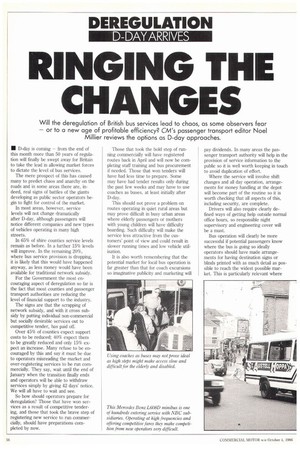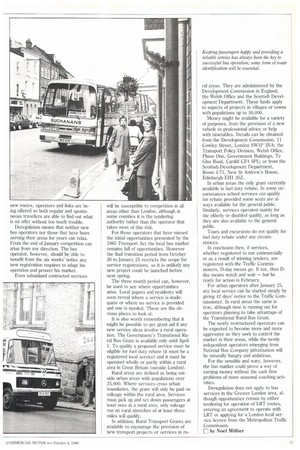RINGING TH CHANGES
Page 58

Page 59

If you've noticed an error in this article please click here to report it so we can fix it.
Will the deregulation of British bus services lead to chaos, as some observers fear — or to a new age of profitable efficiency? CM's passenger transport editor Noel Millier reviews the options as D-day approaches.
• D-day is coming — from the end of this month more than 50 years of regulation will finally be swept away for Britain to take the lead in allowing market forces to dictate the level of bus services.
The mere prospect of this has caused many to predict chaos and anarchy on the roads and in some areas there are, indeed, real signs of battles of the giants developing as public sector operators begin to fight for control of the market.
In most areas, however, service levels will not change dramatically after D-day, although passengers will notice different companies and new types of vehicles operating in many high streets.
In 65% of shire counties service levels remain as before. In a further 15% levels will improve. In the remaining 20%, where bus service provision is dropping, it is likely that this would have happened anyway, as less money would have been available for traditional network subsidy.
For the Govenunent the most encouraging aspect of deregulation so far is the fact that most counties and passenger transport authorities are reducing the level of financial support to the industry.
The signs are that the scrapping of network subsidy, and with it cross subsidy by putting individual non-commercial but socially desirable services out to competitive tender, has paid off.
Over 45% of counties expect support costs to be reduced; 40% expect them to be greatly reduced and only 15% expect an increase. Many refuse to be encouraged by this and say it must be due to operators misreading the market and over-registering services to be run commercially. They say, wait until the end of January when the transition finally ends and operators will be able to withdraw services simply by giving 42 days' notice. We will all have to wait and see.
So how should operators prepare for deregulation? Those that have won services as a result of competitive tendering, and those that took the brave step of registering new service to run commercially, should have preparations completed by now. Those that took the bold step of running commercially will have registered routes back in April and will now be completing staff training and bus procurement if needed. Those that won tenders will have had less time to prepare. Some may have had tender results only during the past few weeks and may have to use coaches as buses, at least initially after D-day.
This should not prove a problem on routes operating in quiet rural areas but may prove difficult in busy urban areas where elderly passengers or mothers with young children will have difficulty boarding. Such difficulty will make the service less attractive from the customers' point of view and could result in slower running times and low vehicle utilisation.
It is also worth remembering that the potential market for local bus operation is far greater than that for coach excursions so imaginative publicity and marketing will pay dividends. In many areas the passenger transport authority will help in the provision of service information to the public so it is well worth keeping in touch to avoid duplication of effort.
Where the service will involve shift changes and all day operation, arrangements for money handling at the depot will become part of the routine so it is worth checking that all aspects of this, including security, are complete.
Drivers will also require clearly defined ways of getting help outside normal office hours, so responsible night supervisory and engineering cover will be a must Bus operation will clearly be more successful if potential passengers know where the bus is going so ideally operators should have made arrangements for having destination signs or blinds printed with as much detail as possible to reach the widest possible market. This is particularly relevant where new routes, operators and links are being offered so both regular and spontaneous travellers are able to find out what is on offer without too much trouble.
Deregulation means that neither new bus operators nor those that have been serving their areas for years can relax. From the end of January competition can arise from any direction. The bus operator, however, should be able to benefit from the six weeks' notice any new registration requires to adapt his operation and protect his market.
Even subsidised contracted services will be susceptible to competition in all areas other than London, although in some counties it is the tendering authority rather than the operator that takes most of this risk.
For those operators that have missed the initial opportunities presented by the 1985 Transport Act the local bus market remains full of opportunities. However the final transition period from October 26 to January 25 restricts the scope for service registrations, so it is unlikely any new project could be launched before next spring.
The three month period can, however, be used to see where opportunities arise. Local papers and residents will soon reveal where a service is inadequate or where no service is provided and one is needed. These are the obvious places to look at.
It is also worth remembering that it might be possible to get grant aid if any new service ideas involve a rural operation. The Government's Transitional Rural Bus Grant is available only until April 1. To qualify a proposed service must be eligible for fuel duty rebate (it must be a registered local service) and it must be operated wholly or partly within a rural area in Great Britain (outside London).
Rural areas are defined as being outside urban areas with populations over 25,000. Where services cross urban boundaries, the grant will only be paid on mileage within the rural area. Services must pick up and set down passengers at least once in a rural area; only mileage run on rural stretches of at least three miles will qualify.
In addition, Rural Transport Grants are available to encourage the provision of new transport projects or services in iii ml areas. They are administered by the Development Commission in England, the Welsh Office and the Scottish Development Department. These funds apply to aspects of projects in villages or towns with populations up to 10,000.
Money might be available for a variety of purposes, from the provision of a new vehicle to professional advice or help with timetables. Details can be obtained from the Development Commission, 11 Cowley Street, London SW1P 3NA; the Transport Policy Division, Welsh Office, Phase One, Government Buildings, Ty Glas Road, Cardiff CF4 5PL; or from the Scottish Development Department, Room 4171, New St Andrew's House, Edinburgh Ell 3SZ.
In urban areas the only grant currently available is fuel duty rebate. In some circumstances school services can qualify for rebate provided some seats are always available for the general public. Similarly, services operated mainly for the elderly or disabled qualify, as long as they are also available to the general public.
Tours and excursions do not qualify for fuel duty rebate under any circumstances.
In conclusion then, if services, whether registered to run commercially or as a result of winning tenders, are registered with the Traffic Commissioners, D-day means go. If not, then D day means watch and wait — but be • ready for action in February.
For urban operators after January 25, any local service can be started simply by giving 42 days' notice to the Traffic Commissioner. In rural areas the same is true, although time is running out for operators planning to take advantage of the Transitional Rural Bus Grant.
The newly restructured operators can be expected to become more and more aggressive as they seek to control the market in their areas, while the newly independent operators emerging from National Bus Company privatisation will be naturally hungry and ambitious.
For the sensible and wary, however, the bus market could prove a way of earning money without the cash flow problems of more seasonal coaching activities.
Deregulation does not apply to bus services in the Greater London area, although opportunities remain by either tendering for operation of LRT routes, entering an agreement to operate with LRT or applying for a London local service licence from the Metropolitan Traffic Commission.
E by Noel Millier








































































































































